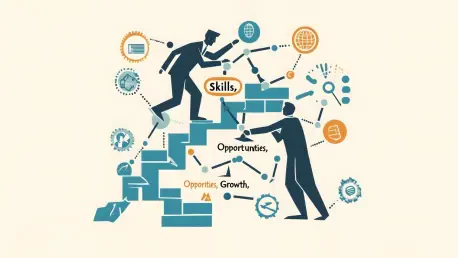The modern workplace is constantly evolving, and the skills required to succeed within it are changing at an unprecedented pace. A significant challenge facing today’s workforce is the growing skills gap, driven by rapid technological advancements like AI and automation. Organizations are struggling to align their employees’ capabilities with these shifts, creating a “skills mismatch” that poses risks for innovation and economic stability. This scenario underscores the necessity for strategic reskilling and a culture of continuous learning to prevent employees from becoming obsolete and to secure their relevance in evolving job markets.
Current State of Workforce Skills
The landscape of workforce skills is in flux, influenced by the relentless pace of technological change and shifting market demands. Prevailing trends highlight a substantial need for reskilling as tools and methodologies become outdated rapidly. Key industry players are continuously adapting their practices to keep up with technological advancements, reshaping workforce dynamics. Additionally, regulations play an integral role in guiding these transformations, ensuring that workforce practices align with legal requirements and ethical standards, thereby fostering an adaptive workforce prepared for future challenges.
Influencing Trends and Technologies
Emerging Trends in Workforce Dynamics
In today’s dynamic work environments, digital transformation and changing consumer preferences are redefining workforce dynamics. Businesses are facing pressures to innovate and adapt to these new trends, as staying competitive increasingly demands agility and foresight. Opportunities arise from these transformations, offering organizations avenues to refine strategies, exploit market gaps, and address consumer needs proactively. For employees, this implies a need to stay adaptable and continuously develop new skills to meet evolving job expectations.
Market Projections and Future Outlook
Current data suggest a noteworthy shift in workforce development and indicate robust growth projections across various industries. Performance indicators reveal areas of potential development where strategic investments can yield prosperous outcomes. As these emerging trends evolve, they will significantly influence future workforce demands, signaling shifts in needed expertise and resource allocation. Organizations should prepare for these changes by fostering environments that nurture skill growth and innovation, ensuring they remain equipped to handle upcoming challenges.
Challenges Facing the Skills Revolution
The skills revolution faces numerous challenges presented by technological, regulatory, and market forces. Organizations must navigate these hurdles with comprehensive strategies that ensure their workforce remains skilled and competitive. Addressing technology-driven disruptions requires agility and foresight, while regulatory constraints may necessitate adherence to compliance and security standards. By implementing robust strategies such as reskilling and skills audits, businesses can effectively overcome these barriers and position themselves for sustainable growth.
Navigating Regulatory Landscape
Navigating the regulatory landscape is a crucial factor affecting workforce skills development. Organizations must adhere to relevant laws, standards, and regulations to ensure compliance and maintain industry standards. Security measures also play a vital role in safeguarding information and processes, ensuring the integrity of skill development. Compliance with these regulations is essential not only for legal adherence but also for fostering an environment conducive to skill enhancement and ethical practices.
Future Directions and Innovations
The future of workforce skills will be influenced profoundly by emerging technologies and potential disruptors. Breakthrough innovations offer avenues for growth in new skill areas, driven by consumer trends and economic factors. Organizations must anticipate these shifts and integrate them into their strategic planning, paving the way for innovative solutions and efficient workforce management. Adapting to these changes will require a focus on reskilling efforts that align with predicted disruptors, ensuring sustained success amidst an ever-evolving business landscape.
Conclusion and Recommendations
Reflecting on the state of workforce skills, the analysis underscores the imperative for organizations to embrace strategic reskilling initiatives and continuous learning cultures. Leveraging technological advancements responsibly while complying with regulatory standards is critical for navigating the skills revolution successfully. The journey ahead requires proactive measures to adapt to shifting demands, enabling organizations and employees to thrive in this transformative era. Identifying potential growth or investment opportunities will further empower businesses to capitalize on evolving workforce dynamics, ensuring long-term resilience and competitiveness in the industry.









